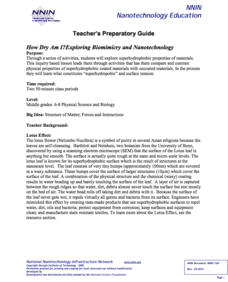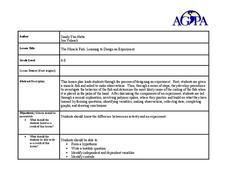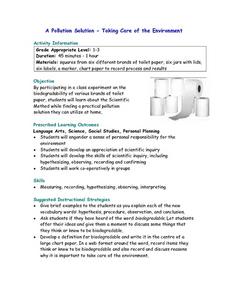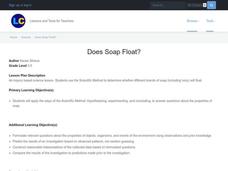American Chemical Society
Mixing Liquids to Identify an Unknown Liquid
Yellow and blue make green in a colorful lesson plan on liquid solutions. The seventh installment of a 16-part Inquiry to Action series asks pupils to mix different-colored solutions and record their observations. They then use their...
American Chemical Society
The Energy of Evaporation
Do all liquids evaporate at the same rate? Young scientists observe the evaporation rate of three different liquids. They measure the time, the temperature, and the change in energy. After comparing the chemical formulas, scholars...
National Nanotechnology Infrastructure Network
How Dry am I? Exploring Biomimicry and Nanotechnology
Help your classes feel like they can walk on water! An engaging inquiry-based activity has young scholars experiment with different surface coatings. They make observations about their properties and how they relate to the surface...
National Nanotechnology Infrastructure Network
Gelatin Microfluidics
Micro what? Analyze microfluidics as an application in the medical community. A lab investigation highlights the importance of channel design in biotechnology. Learners modify channels and observe the behavior of the flow of the fluids.
Cold Spring Harbor Laboratory
A Genome Is an Entire Set of Genes
Today researchers identify a gene suspected of causing a genetic disease in a matter of days rather than years, thanks to the Human Genome Project. Young scientists learn about the Human Genome Project and the scientists who designed the...
Science Matters
Series Circuit and Switches
Lights out! Scholars build on their understanding of a simple circuit by adding a switch and creating schematic drawings. The eighth activity in a series of 14 has pupils use everyday materials to create circuits and make observations as...
Museum of Science
Garden in a Glove
Calling all green thumbs! Using a clear plastic glove, pupils create a plant nursery. Learners plant different types of seeds in a moistened cotton ball that is placed into each of the fingers in the glove. Leaving the seeds there for...
American Chemical Society
Identifying an Unknown Liquid
Liquids are what's the matter with the lesson! Learners investigate properties of different liquids as they interact with various types of paper. They then use their observations to identify a mystery liquid to finish the sixth lesson in...
American Chemical Society
Dissolving an M&M
Here's a sweet lesson plan to explore solutes and solvents. Using candies and water, learners observe properties of parts of the solution as the candies dissolve. They then modify the setup and note variations in the solution.
American Chemical Society
Dissolving is a Property
Believe it or not, it is possible for liquids and solids to get along! A hands-on lesson has individuals explore dissolving properties of candies in water. They complete an activity guide to record observations about different candies...
PBS
Star Power
Let there be light—or maybe not. Pupils learn about light pollution with an investigation of constellations. They create constellation boxes and experiment with different levels of light. Observations are then made about the lighting in...
Curated OER
The Miracle Fish: Learning to Design an Experiment
Learners develop procedures to explore the behavior of fish. In this scientific experiment lesson students from a hypothesis, write a question, identify different variables and controls in their experiment.
Curated OER
Thinking Like a Scientist
In this scientific method worksheet, students fill in 10 blanks with terms related to the scientific method. Then they determine if 3 sentences are true or false and they match 6 terms with their definitions.
Curated OER
Using Inspiration To Support Logical Reasoning
Students share descriptions of science experiments they have conducted. They create a thin film on the surface of water in order to float light objects and observe that a paper clip does, indeed, float on the surface of the water at...
Curated OER
Color Me Hot
Seventh graders use the scientific method, to observe, record and analyze the data they gathered. They make observations using their five senses. Students compare, contrast and draw conclusions based on the observations and data...
Curated OER
Temperature School
Pupils observ the cooling and warming of room temperature, hot, and ice cold cans of water by measuring the change in temperature over time. They then attempt to develop explanations for the observations made and apply their findings to...
Curated OER
A Pollution Solution- Taking Care of the Environment
Learners examine the biodegradability of different brands of toilet paper in a hands-on activity. Through this activity they also discover the steps of the Scientific Method and use new terms such as hypothesis, procedure, observation,...
Curated OER
Floating Soap
Students use the Scientific Method steps to complete an experiment on various brands of soap to determine their floating capabilities. In this scientific method lesson, students write a hypothesis about the ability of various soap bars...
Curated OER
Thinking Like a Scientist
Students explore the scientific method. Students identify the steps in the scientific method and explain what each step means. Students use these steps to determine if boys or girls are taller in their classroom.
Curated OER
Creeping
Young scholars observe, measure, and graph a model of slow down slope movement representing soil creep. This task assesses students' abilities to collect, record, and organize data, set up graph axes, plot data points, draw line graphs,...
Curated OER
Peat Pots
Students place a peat pot in water to observe and calculate the rate of capillarity in a model of a soil. This task assesses students' abilities to make simple observations, collect, record, and represent data, use a data table to...
Curated OER
Gravity Lesson
Fifth graders study the effects of mass on gravity. In this gravity lesson, 5th graders make model parachutes and helicopters in order to apply the scientific process and find out the effects of mass on drops of the 2 objects.
Curated OER
Creek Restoration Project
Students gather and analyze scientific data from a local creek. Over weeks or months, students observe their local environment, collect water samples, and evaluate test results. Extension activities are suggested for evaluating...
Curated OER
Alka-Seltzer Cannons
Fourth graders examine how to conduct a reliable scientific experiment so that the results are valid. They compare and contrast the reaction of Alka-Seltzer tables, one whole and one crushed, and time how long each takes to pop the top...

























